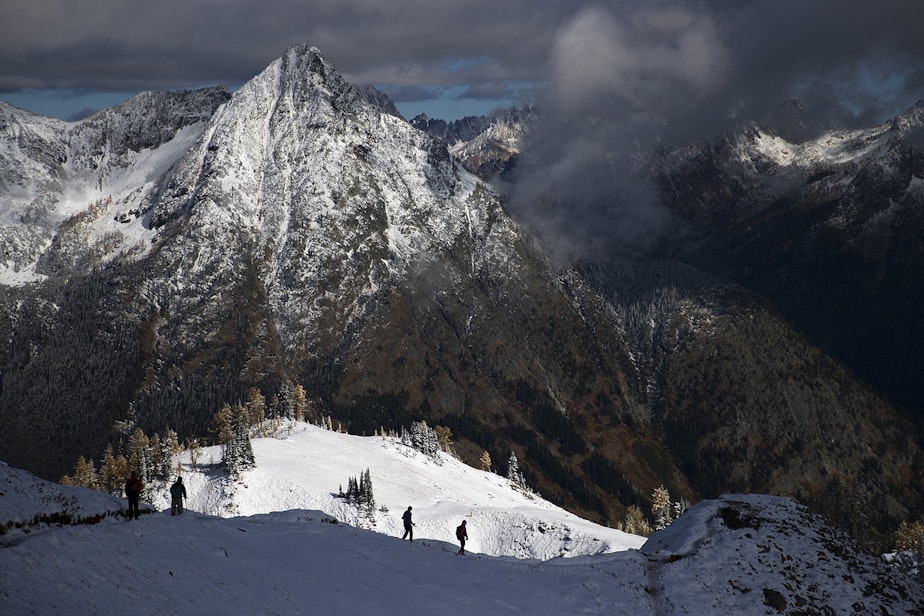5 unexpected ways the government shutdown affects Seattle and Washington state

For one, earthquake monitoring. Yikes.
The longest shutdown in U.S. history was 21 days under President Bill Clinton. The partial government shutdown, now the third under President Donald Trump, reaches that mark on Friday, January 10th. Its impacts are far reaching in Washington, straining earthquake research and, soon, food assistance.
1
Earthquake monitoring
Five of the engineers at Pacific Northwest Seismic Network were furloughed from the U.S. Geological Survey. The organization continues to track earthquake activity, but Director Paul Bodin says repairs on their sensors, research on earthquakes, and public education (including expanding Shake Alert) is on hold.
"We've been lucky and there haven't been a lot of earthquakes," Bodin said. "As we move forward, particularly beyond next week, things are gonna get much more tenuous."
Bodin said a contract to monitor earthquakes at Washington's volcanoes runs out on January 31.
2 Food stamps
More than 800,000 people in Washington state participate in the Supplemental Nutrition Assistance Program (SNAP).
Food stamps and other SNAP benefits haven't run out ... yet. That could change in February.
Cuts or disruptions to food benefits could begin then if the shutdown continues, according to the Washington State Department of Social and Health Services (DSHS).
DSHS does not yet have guidance from the federal government on how to proceed past January.
3 Those people who work for the feds, but through a contractor
Thousands of government workers will miss their Jan. 10 paycheck, but it's understood they will get back pay.
That's no consolation for workers like Jessica Kostrab, who was laid off from her job at a hotel inside Mount Rainier National Park, which closed January 6. Kostrab said without tourists, nearby businesses are hurting.
"It's weird not knowing whether or not I can buy groceries next week, or if I'll be able to pay rent next month or if I can pay my car payment," she said. "It's saddening to see that this had to happen."
She expects to get rehired, without back pay, when the shutdown ends.
4 Actors won't get paid in Seattle
Due to a paperwork glitch, Seattle Shakespeare Company did not get an expected $15,000 grant from the National Endowment for the Arts. Theater Managing Director John Bradshaw said that money pays for several weeks of actors’ salaries. The company expects to receive the money when the government reopens.
Film production companies that work on federal lands cannot get permits right now. The National Parks Service requires permit requests 30 days ahead of filming. Production companies have filmed outdoors and house hunting shows in North Cascades National Park in the past.
5 Commercial flights
Have you seen the billboards announcing passenger flights out of Everett? The shutdown could delay those.
The first-ever commercial flights from the airport are slated for February 11, but Paine Field is awaiting final approval for the flights from the Federal Aviation Administration. Alaska Airlines and United Airlines will offer 24 daily trips from Paine Field.
Operations at Sea-Tac International Airport have not been interrupted by the shutdown, according to spokesperson Perry Cooper. TSA personnel have continued on the job, despite some TSA workers conducting "sick outs" and staying home, due to no pay from the federal government. The Port of Seattle said 2,000 federal employees at Sea-Tac will miss paychecks on January 11.
Washington state has 73,000 federal employees.
12,905 are directly affected by the shutdown, most of them by furlough from their job. Among those furloughed workers, 1,600 have applied for unemployment benefits since the shutdown began. Washington state's Employment Security Department says it is triaging requests that come in and has separate staff handling requests by federal workers right now.
KUOW's Marcie Sillman contributed to this report.





